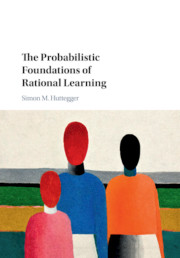Book contents
- Frontmatter
- Dedication
- Contents
- List of Figures
- Preface and Acknowledgments
- Introduction: Abstract Models of Learning
- 1 Consistency and Symmetry
- 2 Bounded Rationality
- 3 Pattern Learning
- 4 Large Worlds
- 5 Radical Probabilism
- 6 Reflection
- 7 Disagreement
- 8 Consensus
- Appendix A Inductive Logic
- Appendix B Partial Exchangeability
- Appendix C Marley's Axioms
- Bibliography
- Index
7 - Disagreement
Published online by Cambridge University Press: 25 October 2017
- Frontmatter
- Dedication
- Contents
- List of Figures
- Preface and Acknowledgments
- Introduction: Abstract Models of Learning
- 1 Consistency and Symmetry
- 2 Bounded Rationality
- 3 Pattern Learning
- 4 Large Worlds
- 5 Radical Probabilism
- 6 Reflection
- 7 Disagreement
- 8 Consensus
- Appendix A Inductive Logic
- Appendix B Partial Exchangeability
- Appendix C Marley's Axioms
- Bibliography
- Index
Summary
The criteria incorporated in the personalistic view do not guarantee agreement on all questions among all honest and freely communicating people, even in principle.
Leonard J. Savage The Foundations of StatisticsLearning models usually feature an individual agent who responds in some way to new information. They are monological, in the sense that they ignore that learning often takes place in a social context. The learning models discussed in previous chapters are no exception. In the last two chapters of this book I wish to pursue two issues that are relevant for extending my approach to social epistemology.
Both topics have to do with epistemic disagreement. Disagreement is ubiquitous in many areas of our lives. It is common in cutting-edge science, economics, business, politics, religion, and philosophy, not to mention the many ordinary disagreements we all have to deal with day to day. Many of our disagreements have epistemic aspects. For instance, divergent economic policies may be based on different assessments of data and models. What is the relationship between epistemic disagreements and rational learning? To what extent are divergent opinions compatible with all agents being epistemically rational? Finding answers to these questions is of crucial importance.
This chapter focuses on learning from others. The opinions of other agents who might disagree with you are taken as evidence that can cause you to change your beliefs. We will see that this learning situation requires no substantially new solution. Radical probabilism provides us with all the resources to model updating on the opinions of other agents. The most important part of this chapter is a “rational reconstruction” of a rule for merging the opinions of agents which has been much discussed in the epistemological literature on peer disagreement. This rule, which is known as straight averaging, combines the opinions of a group of agents additively by assigning each of them equal weights. I will show that something close to straight averaging emerges from combing a principle of Carnapian inductive logic with the theory of higher-order probabilities.
- Type
- Chapter
- Information
- The Probabilistic Foundations of Rational Learning , pp. 149 - 166Publisher: Cambridge University PressPrint publication year: 2017



